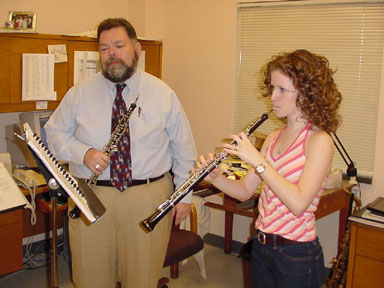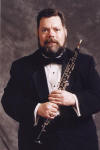|
Fundamental Guidelines for the Oboe Student by |
Hand Position
Fingers curved. Thumbs always on
the instrument, never in the air.
Little fingers (pinkies)
should easily reach the (left)
E-flat
and
the (right) D-flat
keys.
Posture
Sit up straight, bring the oboe
to your mouth, do not "bow" or bend your
head to the instrument.
Embouchure
Play with an open mouth. Teeth apart, lips rolled in, mouth
in a "whistle" or "pucker" formation. "Focus"
towards the upper lip.
Breathing and
Blowing
Breath from the stomach, but a "full
tank'' is not needed. Do not "over blow" the reed;
quality (a fast air stream) not quantity is the most important
aspect of blowing on the oboe. Keep the air at the tip of the
reed.
Tonguing
Tongue with the tip of the tongue
on the tip of the reed. Tongue only with the tongue; do not tongue
with the jaw (chew) or tongue with the wind.
Reeds
There are three requirements for a good reed:
-
Stability - the reed should "crow" a C free of rattle and show the lower octave when pushed. It should play in tune in all registers with very little movement of the embouchure.
-
Response - the reed should respond in all registers at all dynamic levels with little effort.
-
Tone - the reed should produce a dark tone quality without having to cover with the lips, thereby restricting stability and response.
To make reeds last longer and play more consistently: always soak reeds in water a few minutes before playing and store them in a reed case that allows them to dry out completely. Never try to play on a dry or partially soaked reed, this will cause them to crack and/or leak.
| If you would like to be added to the TSMP Email Mailing List and receive periodic notifications of new articles and updates to this website, then please email TSMP.
The Texas School Music
Project is a source for ideas and information
concerning pedagogical
practices in the music classroom or rehearsal hall. The TSMP is a service provided to
all music specialists by the faculty
of
the Department of Music
at Stephen F. Austin State University. Copyright © 2002, Department of Music at Stephen F. Austin State University |
